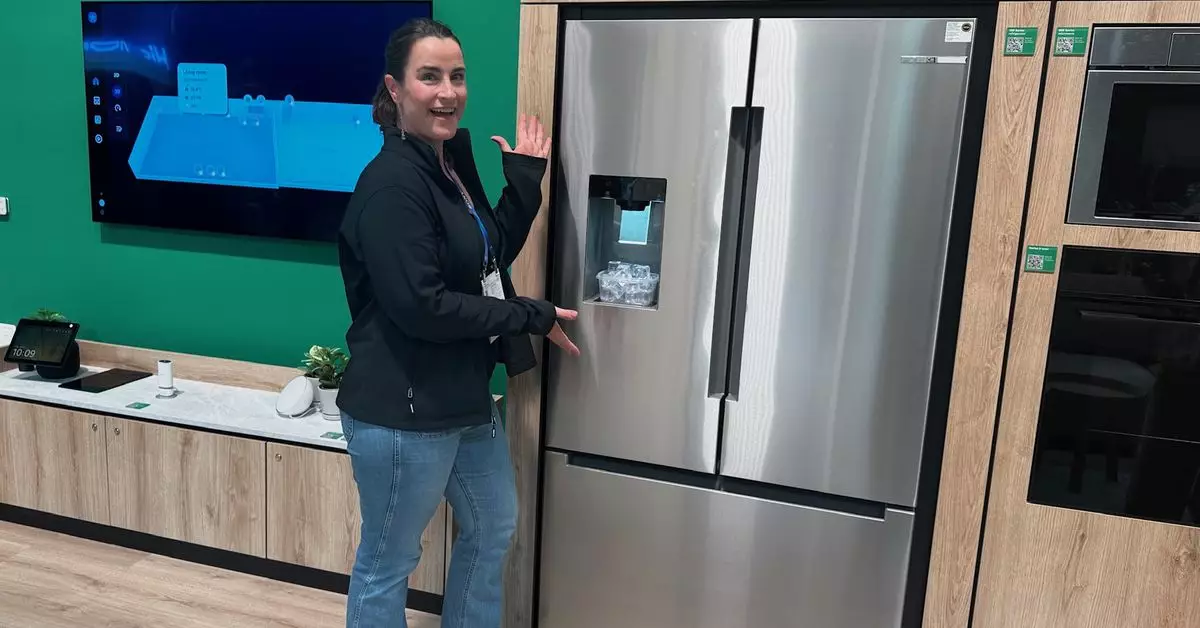As the realm of smart home technology expands, major players in appliance manufacturing are beginning to embrace interoperability standards that promise easier and more seamless integration of devices. Among these innovators, Bosch stands out with its introduction of the 100 Series French Door Bottom Mount Refrigerator at CES. This appliance not only marks a significant advancement in smart refrigeration but represents the evolving landscape of smart home technology driven by Matter.
The 100 Series Refrigerator, which debuted in November 2023 and is set to hit the US market in spring 2024, carries a retail price of $2,500. What sets this fridge apart is its built-in capability to support Matter, an interoperability standard designed to provide a universal communication framework among smart devices. The implications of Matter are profound; it enables a local, fast, and secure connection, shedding the dependency on cloud-based networking that has historically plagued smart home devices with latency and privacy issues.
Eelco Lammertink, a key spokesperson for Bosch, asserts that this development is not just a standalone achievement but part of a larger strategy. Bosch, under its parent company BSH, plans to roll out Matter support across its entire line of appliances, including those from Siemens and Thermador. This burgeoning ecosystem hints at the company’s dedication to addressing consumer pain points regarding compatibility and interfacing. With the intention to expand Matter-enabled appliances beyond refrigerators in the coming years, Bosch is positioning itself at the forefront of the smart home revolution.
The refrigeration unit is compatible with Matter version 1.3, which unlocks a suite of advanced features tailored for modern homeowners. Users can manage temperature settings remotely and receive real-time alerts through their preferred smart home platform. For instance, if the fridge’s door is left ajar, a smart speaker could announce this necessary reminder, significantly enhancing user convenience and energy efficiency.
While these features already exist in many high-end refrigerators, the Matter standard elevates their functionality by ensuring a locally-based connection. This transition not only enhances performance but also signals a shift towards more secure data handling practices. Currently, Matter-compatible integration with platforms such as Samsung SmartThings and Home Assistant stands at the forefront, with Amazon indicating future support.
However, the conversation around smart appliances isn’t without its limitations. Lammertink mentioned that existing appliances won’t be retrofitted with Matter support due to significant technical challenges. This could prove frustrating for consumers invested in Bosch’s earlier models, highlighting the hurdles manufacturers face in integrating new protocols with legacy systems.
Matter, developed by a consortium of tech giants including Apple, Amazon, Google, and Samsung, aims to create a simplified and unified ecosystem for smart home devices. This standard is crucial as it enables a plethora of device types—from lighting solutions to home security systems—to interact with one another seamlessly. The handling of different device categories under a single protocol paves the way for sophisticated home automation scenarios, where energy efficiency and user experience can reach new heights.
The specific mention of energy management capabilities for the 100 Series Refrigerator signals a shift towards sustainability in home appliances. With energy reporting features, users can better manage their household’s power consumption, aligning with growing environmental awareness. It hints at a future where smart appliances not only serve functional roles but also contribute positively to energy sustainability.
As Bosch leads the charge with its Matter-compatible 100 Series Refrigerator, it reflects a broader trend in home appliance innovation. The move towards interoperability is an acknowledgment of the increasingly interconnected nature of modern living, where utility and efficiency are paramount. The successful implementation of Matter across Bosch’s lineup could set a precedent for the industry, encouraging other manufacturers to adopt similar standards.
In sum, the arrival of Matter in the smart home landscape is more than just a fleeting trend; it represents the dawn of a new era of integrated living spaces, promising convenience, efficiency, and energy management in every appliance, ultimately enriching the consumer experience.

